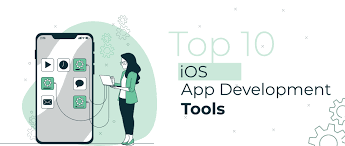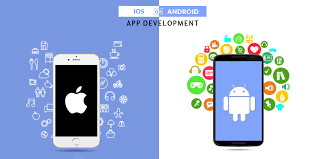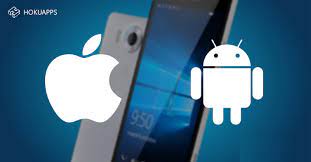Exploring Top iOS App Development Software for Building Innovative Apps
iOS App Development Software: Tools for Building Amazing Apps
Developing iOS apps requires the right set of tools to bring your ideas to life and create engaging user experiences. Whether you are a seasoned developer or just starting out, having access to the best iOS app development software can make all the difference in the quality and success of your applications.
Xcode
Xcode is Apple’s official integrated development environment (IDE) for creating iOS apps. It offers a comprehensive set of tools, including a code editor, debugger, and interface builder. With features like Interface Builder, Swift compiler, and performance analysis tools, Xcode streamlines the app development process and helps developers build high-quality apps efficiently.
Swift
Swift is Apple’s programming language designed specifically for iOS app development. Known for its speed, safety, and modern syntax, Swift makes it easier for developers to write clean and concise code. By leveraging Swift’s powerful features like optionals, generics, and type interference, developers can create robust and efficient iOS apps that run smoothly on Apple devices.
AppCode
AppCode is an alternative IDE for iOS app development that offers advanced coding assistance and productivity tools. Developed by JetBrains, AppCode supports multiple languages like Objective-C, Swift, and C++, making it a versatile choice for developers working on iOS projects. With features like code refactoring, intelligent code completion, and seamless integration with version control systems, AppCode enhances developers’ efficiency and code quality.
Firebase
Firebase is a comprehensive mobile development platform that provides backend services for iOS app development. From real-time database to cloud messaging to authentication services, Firebase offers a suite of tools that simplify common app development tasks. By integrating Firebase into their iOS apps, developers can focus on building great user experiences without worrying about managing server infrastructure.
Adobe XD
Adobe XD is a design tool that enables designers to create interactive prototypes and user interfaces for iOS apps. With features like artboards, symbols, and responsive resize capabilities, Adobe XD empowers designers to visualize their app designs across different devices and screen sizes. By creating prototypes in Adobe XD, designers can collaborate with developers more effectively and ensure a seamless design-to-development workflow.
Choosing the right iOS app development software is essential for creating successful apps that resonate with users. By leveraging tools like Xcode, Swift,
AppCode,
Firebase,
and Adobe XD,
developers can streamline their workflow,
write efficient code,
and deliver exceptional user experiences on Apple devices.
Whether you are building your first iOS app or enhancing an existing one,
having access to the best software tools can help you achieve your goals
and stand out in the competitive world of mobile app development.
9 Essential Tips for Successful iOS App Development
- Understand the iOS Human Interface Guidelines for designing user-friendly apps.
- Use Xcode as the primary Integrated Development Environment (IDE) for iOS app development.
- Familiarize yourself with Swift programming language for building iOS apps.
- Utilize Interface Builder in Xcode to create visually appealing user interfaces.
- Test your app on real iOS devices to ensure compatibility and performance.
- Implement proper error handling and incorporate analytics tools for monitoring app performance.
- Stay updated with the latest iOS versions and features to leverage new functionalities in your apps.
- Optimize app performance by following best practices in coding, such as efficient memory management.
- Engage with the Apple Developer community for support, resources, and networking opportunities.
Understand the iOS Human Interface Guidelines for designing user-friendly apps.
To create user-friendly iOS apps, it is crucial to understand and adhere to the iOS Human Interface Guidelines. These guidelines provide valuable insights into designing interfaces that are intuitive, consistent, and visually appealing for users. By following the guidelines, developers can ensure that their apps meet Apple’s design standards and offer a seamless user experience across different devices. Understanding the principles outlined in the iOS Human Interface Guidelines is essential for creating apps that not only look great but also function smoothly and engage users effectively.
Use Xcode as the primary Integrated Development Environment (IDE) for iOS app development.
When it comes to iOS app development, utilizing Xcode as the primary Integrated Development Environment (IDE) is a strategic choice. Xcode, Apple’s official IDE, offers a comprehensive suite of tools that streamline the app development process. With features like Interface Builder, Swift compiler, and debugging capabilities, Xcode provides developers with a robust platform to create high-quality iOS apps efficiently. By leveraging Xcode’s integrated workflows and performance analysis tools, developers can optimize their coding experience and focus on building innovative and user-friendly applications for Apple devices.
Familiarize yourself with Swift programming language for building iOS apps.
To excel in iOS app development, it is crucial to familiarize yourself with the Swift programming language. Swift, Apple’s modern and powerful language, is specifically designed for building iOS apps. By mastering Swift, developers can write clean, efficient code that takes full advantage of iOS platform capabilities. Understanding Swift’s syntax, features like optionals and generics, and its seamless integration with Xcode IDE can significantly enhance the development process and enable the creation of high-quality iOS apps that deliver exceptional user experiences.
Utilize Interface Builder in Xcode to create visually appealing user interfaces.
To enhance the visual appeal of your iOS app, make the most of Interface Builder in Xcode. This powerful tool allows you to design and customize user interfaces with ease, offering a range of features like drag-and-drop functionality, pre-built UI elements, and real-time previews. By leveraging Interface Builder effectively, developers can create visually stunning and user-friendly interfaces that enhance the overall user experience of their iOS applications.
Test your app on real iOS devices to ensure compatibility and performance.
Testing your app on real iOS devices is crucial to ensure compatibility and performance. While simulators can provide a basic idea of how your app functions, real devices offer a more accurate representation of how users will interact with your app in the real world. By testing on various iOS devices, you can uncover potential issues related to different screen sizes, resolutions, and hardware configurations. This process allows you to optimize your app for a seamless user experience across a wide range of Apple devices and ensure that it performs reliably in different scenarios.
Implement proper error handling and incorporate analytics tools for monitoring app performance.
To ensure the smooth operation and optimal performance of your iOS app, it is crucial to implement proper error handling mechanisms and integrate analytics tools for monitoring its performance. By incorporating robust error handling practices, you can identify and address potential issues proactively, enhancing the overall stability and user experience of your app. Additionally, leveraging analytics tools allows you to gather valuable insights into user behavior, app usage patterns, and performance metrics. This data-driven approach enables you to make informed decisions, optimize your app’s functionality, and continuously improve its performance based on real-time feedback and analytics data.
Stay updated with the latest iOS versions and features to leverage new functionalities in your apps.
Staying updated with the latest iOS versions and features is crucial for iOS app developers to leverage new functionalities in their apps effectively. By keeping abreast of Apple’s updates, developers can take advantage of the latest tools, APIs, and capabilities introduced in each release. This not only allows developers to enhance their apps with cutting-edge features but also ensures compatibility with newer devices and operating systems, providing users with a seamless and up-to-date experience. Embracing the latest iOS advancements enables developers to stay ahead of the curve and deliver innovative solutions that meet the evolving needs of users in the dynamic mobile app landscape.
Optimize app performance by following best practices in coding, such as efficient memory management.
To optimize app performance in iOS app development, it is crucial to adhere to best practices in coding, including efficient memory management. By implementing proper memory management techniques, such as avoiding memory leaks and optimizing resource usage, developers can ensure that their apps run smoothly and respond quickly to user interactions. Effective memory management not only enhances the overall performance of the app but also contributes to a better user experience by minimizing crashes and improving responsiveness. By prioritizing efficient memory handling in their coding practices, developers can create high-quality iOS apps that deliver exceptional performance on Apple devices.
Engage with the Apple Developer community for support, resources, and networking opportunities.
Engaging with the Apple Developer community is a valuable tip for iOS app development software. By actively participating in this community, developers gain access to a wealth of support, resources, and networking opportunities that can enhance their skills and knowledge. Whether seeking technical assistance, staying updated on the latest trends, or connecting with like-minded professionals, being part of the Apple Developer community fosters collaboration and growth in the ever-evolving world of iOS app development.





